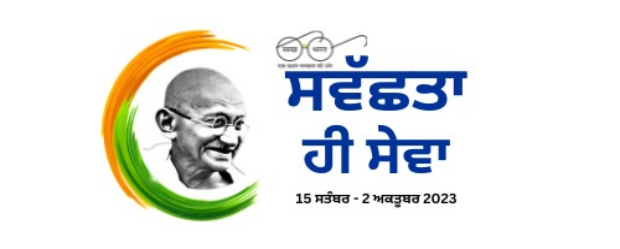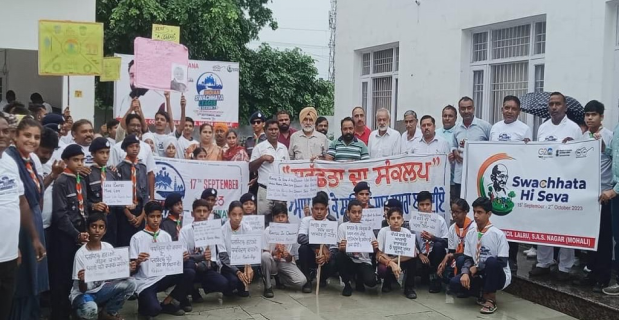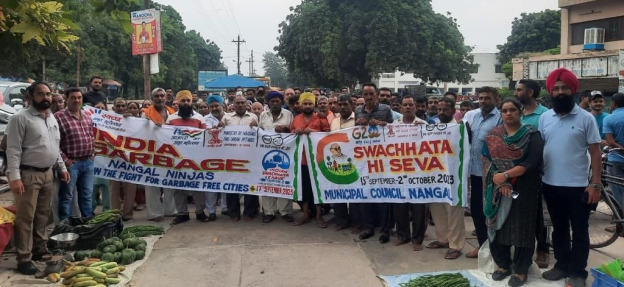‘Swachhata Hi Sewa’ Campaign Sweeps Across All 23 Districts of Punjab
In Punjab, the Swachhata Hi Sewa 2023 campaign is witnessing great enthusiasm among the masses. Prominent figures, including politicians and district administrators, launched the campaign across all 23 districts on 15th September, 2023. Various state government departments including department of Water Supply and Sanitation have joined forces to organize cleanliness drives and disseminate messages about keeping our surroundings clean to achieve the goal of a ‘Garbage-Free India’. These activities were carried out at public places like markets, zoological parks, city parks, and small water bodies in cities and villages; and also, in institutional premises such as Anganwadi centers, schools, and government offices across the state. So far, over 64 lakh Punjab residents have participated in over 10,868 campaign activities, contributing around 3.63 crore man-hours, and approximately 10,000 images uploaded on the Swachhata Hi Sewa portal.
Repairing, painting, and cleaning of sanitation assets brought rural and urban volunteers and residents together for a common goal in their respective areas. Various cleaning and plogging drives cleared waste from water bodies and public places. Shramdaan (volunteering) saw the participation of more than 20 lakh people, completing approximately 4875 activities, including cleaning of 1269 institutional buildings, 948 public places, 782 garbage-prone sites, 305 water bodies, 116 riverside and waterfront areas, 71 legacy waste sites, 61 community sanitary complexes, and 58 iconic tourist spots.

Awareness activities and Information, Education, and Communication (IEC) campaigns were conducted among school children to promote clean and hygienic habits and proper garbage disposal through the ‘Hara Geela Sookha Neela’ campaign, emphasizing the importance of waste segregation at an impressionable age. At the school level, Swachhata pledges and activities focused on waste-to-wealth objectives to ensure children become responsible citizens and contribute to a circular economy. Special exposure visits for students included sessions on water quality testing and visits to solid waste management project sites to understand sewage treatment processes and advanced technologies.
The Indian Swachhata League 2.0 garnered significant participation from Punjab’s youth, with cycle rallies and Swachhata runs organized to spread the message of cleanliness. The Municipal Council of Nangal in Rupnagar deserves special mention for actively participating in all activities and conducting an awareness rally that emphasized alternatives to Single-Use Plastic (SUP) and waste segregation at places like bus stands, parking lots, and forested areas.

Mass mobilization events in the state saw participation from almost 34 lakh people, with approximately 2.46 crore man hours dedicated to about 4281 activities. This included around 806 Swachhata Pledges, more than 555 special Gram Sabha meetings, about 505 Samvad programs with people, and over 251 Swachhata run events. District and block-level officers ensured daily plantation drives, cleaning of legacy waste sites, and Swachhata competitions for mass awareness. Participants in this mass mobilization for cleanliness included MLAs and their spouses, district administration officials, Local Municipal Councils, Gram Panchayats, volunteers of Nehru Yuva Kendra and National Service Scheme, self-help groups, youth, school children, district sanitation officers, and sanitation workers.

The state also conducted desludging drives as part of the campaign, focusing on emptying septic tanks and onboarding desludging operators on the mSeva FSM portal, an application launched by the Government of Punjab to prevent environmental pollution through urban-rural convergence. The SafaiMitra Suraksha Shivir was also conducted across Punjab, with a vernacular name to ensure a local connection. Free health check-up camps were organized across districts to promote the health and wellness of sanitation workers, recognizing their utmost importance.
The campaign has been crucial in fostering behavioral change towards cleanliness among the state’s residents. Urban and rural district and block officials conducted public meetings to raise awareness about better hygiene and sanitation practices. Students found educational excursions enthralling as they gained practical knowledge and understood their vitality towards building a sustainable future. Swachhata Hi Sewa – 2023 has so far been a great success in Punjab, with active participation from children, youth, and elders but continued efforts are necessary to realize the vision of a clean India.

